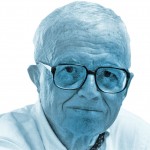
My phone rings and a voice at the other end says “Hello, William?” I know right away that it’s a fundraiser; the only callers who call me “William” are people soliciting money. Why would I give money to an organization so unprofessional that it doesn’t address me as “Mr. Zinsser” on a business matter? If I did give them money I can guarantee they would want my full name on the check.
How did we get into a national state of mind that thinks people want to be treated with feel-good familiarity by strangers? I don’t want to feel good with a fundraiser. Or with my health-care providers. Medical America is a land of no last names. Sitting in the outer room of a clinic or a hospital, waiting to be summoned to some high-tech scan or probe, I hear a voice say “William?” My friends call me “Bill,” so it takes a moment to remember that “William” is me. My summoner is holding my chart, which presumably has my last name at the top; otherwise I wouldn’t have been admitted.
I won’t try to imagine how many old people are patronizingly first-named in nursing homes and retirement centers. The cruelties of age have stripped them of almost all the signifiers that once gave meaning to their lives. At least they still have the dignity of their last name and its associations with work done, children raised, grandchildren loved. Or do they?
I blame the Sixties for getting us into this fix. It was a mantra of the counterculture not to trust anyone over 30. People over 30, among their many suffocating bourgeois customs, used their last name. That killed it for American youth– no last name was heard in the Haight-Ashbury district during the entire Summer of Love in 1967.
Four decades later, the young are still incognito. “I’m Jeff,” they say. “I’m Jennifer,” “I’m Mark.” “Jennifer who?” Mark who?” I say, crabby as a Victorian grandfather. They seem surprised by the question, loath to assert their singularity in an ocean of Jeffs and Jennifers and Marks. I almost dentally extract their last name, and I’m always glad to have it; it completes them.
My brain is an echoing warehouse of ballplayers’ names from my boyhood, many of them linguistic gems: Eppa Rixey, Smead Jolley, Cletus (“Boots”) Poffenberger, Van Lingle Mungo, Wayne Terwilliger, Edd Roush, “Vinegar Bend” Mizell. Since then new tides of immigration have brought names wholly different in shape and sonority but no less resonant: Clemente and Concepción and Carrasquel, Marichal and Martínez, Ichiro and Matsuzaka.
Last names were once so esteemed that they got absorbed into the language as nouns and verbs. Eighty-two such crossovers are described in an enjoyable old book on my reference shelf called Word People, by Nancy Caldwell Sorel, including Charles C. Boycott, Rudolph Diesel, Daniel Fahrenheit, Jules Léotard, Joel Poinsett, George Pullman, James Watt, and Count Ferdinand von Zeppelin.
Browsing in Word People today, I notice some puzzling omissions. The Earl of Cardigan is here, but not Harry Pullover. Amelia Bloomer, but not the Comtesse de Brassière. We get Antoine Sax, inventor of the saxophone, but no mention of Chester Uke. I find Anders Dahl, developer of the dahlia, along with Pierre Magnol of the magnolia, Leonhart Fuchs, and Johann Gottfried Zinn. But where is Claude Petun? I find James H. Logan, developer of the loganberry, but where is Herbert Blue? The Earl of Sandwich is here; Mitch Grinder is not.
Today I see no lack of candidates for last-name beatification. A few who come to mind are the millionaire who got madoffed, the governor who palinizes her answers to the press, and the political charlatan who wears his hair in a trump.

